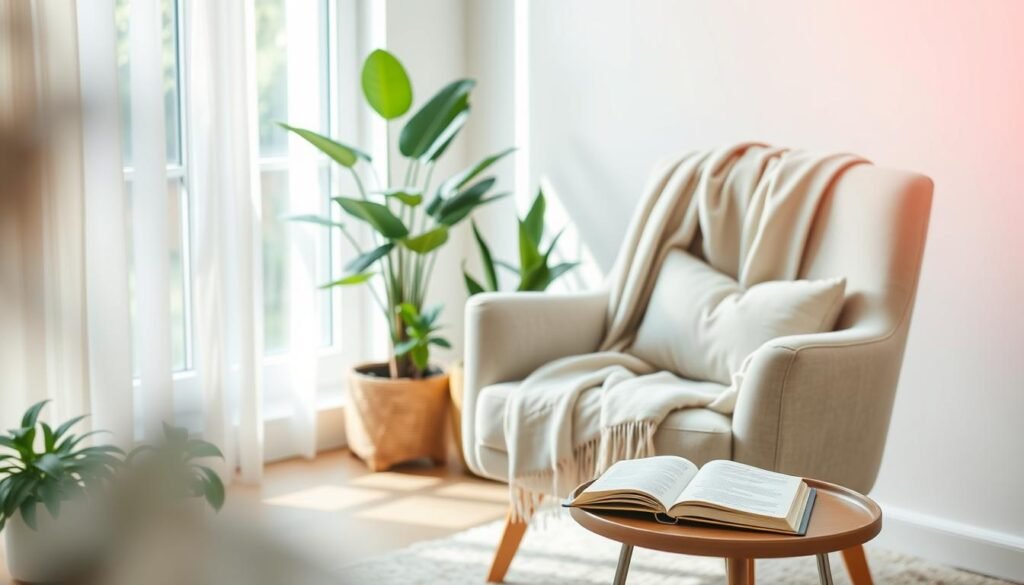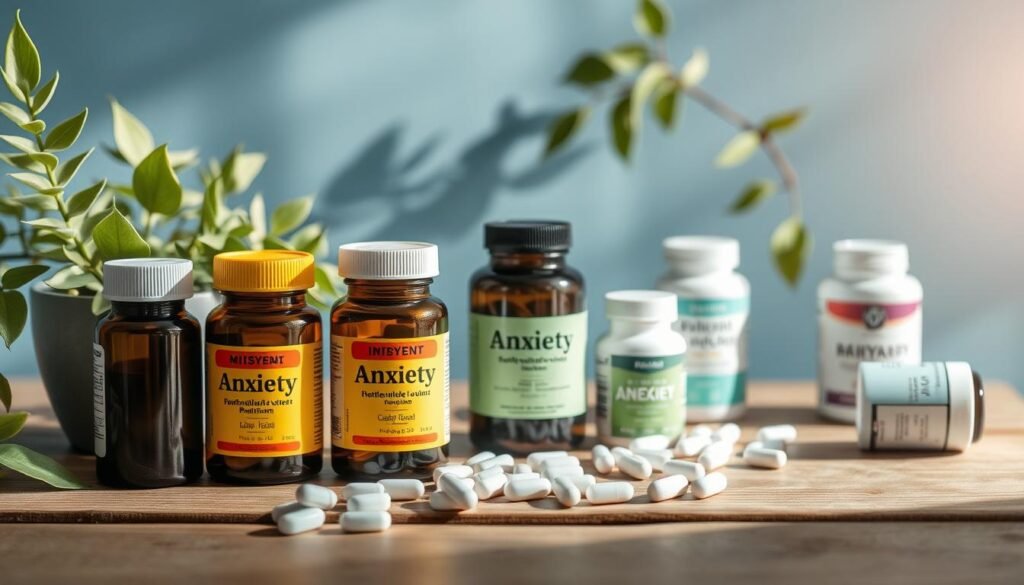Did you know that many people start to feel better after 8 to 10 therapy sessions? This fact comes from the American Psychological Association. It shows how therapy can greatly help with anxiety attacks. These attacks can seriously impact how one lives and their relationships.
Therapy, counseling, and medicine can make managing anxiety possible. They can even improve one’s mental health and overall happiness.
Anxiety disorders are becoming more common. It’s important to look into the many ways to help those affected. Each person’s treatment needs to meet their specific needs. This can lessen their distress, help them fight anxiety, and bring back control over their lives.
In this article, we will look at different ways to heal from anxiety. You will learn about cognitive behavioral therapy (CBT) and mindfulness. These methods have proven to be helpful.
Key Takeaways
- Cognitive behavioral therapy (CBT) is the most effective form of psychotherapy for anxiety disorders.
- Several types of medications can help relieve symptoms of anxiety.
- Lifestyle changes can significantly impact the management of anxiety disorders.
- Support groups provide compassion and shared experiences for those coping with anxiety.
- Individuals often experience significant improvement after just a few therapy sessions.
- Exposure therapy can help individuals regain control over anxiety-inducing situations.
Understanding Anxiety: What Causes Anxiety Attacks?
Anxiety involves many factors. It’s not simple. Knowing what causes anxiety attacks helps us understand mental health better. Genetics, environment, and personal history mix together. This mix makes each person’s anxiety different.
Common Symptoms of Anxiety
It’s crucial to recognize anxiety’s symptoms early. They can be physical or mental. Some people feel extreme fear, have trouble breathing, or their heart beats super fast.
- Extreme fear or dread
- Shortness of breath
- Racing heart rates
- Nausea and gastrointestinal disturbances
- Dizziness and lightheadedness
Spotting these signs helps handle anxiety better. They sometimes show more serious issues that need specific help.
Types of Anxiety Disorders
Anxiety disorders vary a lot. Below is a list of them along with how common they are in the U.S.:
| Type of Anxiety Disorder | Estimated Prevalence |
|---|---|
| Specific Phobia | 8% – 12% |
| Social Anxiety Disorder | 7% |
| Panic Disorder | 2% – 3% |
| Agoraphobia | 1% – 1.7% |
| Generalized Anxiety Disorder | 0.9% (adolescents), 2.9% (adults) |
| Separation Anxiety Disorder | 4% (children), 1.6% (adolescents), 0.9% – 1.9% (adults) |
| Selective Mutism | 0.03% – 1.9% |
Treating anxiety is key to improving life. Knowing the types helps us find better treatments and ways to cope.
Why Seek Help for Anxiety Attacks?
Anxiety attacks can turn your daily life upside down. They affect not just you but also your relationships with others. When you know about the Impact of Anxiety on Relationships, you see why Seeking Help for Anxiety matters. Experts offer ways to deal with anxiety that make your relationships better.
Impact on Daily Life and Relationships
Anxiety touches various parts of life for many people. It can make it hard to work, study, or be social. Such struggles can harm one’s connections with others. The common issues seen are:
- Relationships with loved ones suffer due to pulling away and not talking enough.
- Hard to keep or do well in a job or school, which could lead to losing a job or falling behind in class.
- Feeling cut off from others, which can make loneliness and sadness worse.
Getting help from mental health pros often helps a lot. It makes relationships stronger and helps people feel they belong. Group therapy helps too, with support coming from hearing others’ stories.
Consequences of Untreated Anxiety Disorders
Ignoring anxiety can lead to serious Consequences of Untreated Anxiety. The risks include more than just feeling upset. They are:
- Anxiety getting worse, which could turn into depression or lead to using drugs or alcohol too much.
- Health problems like not being able to sleep, heart beating too fast, or always feeling tired, making heart disease or high blood pressure more likely.
- Continued feelings of hopelessness and being alone, which lower the quality of life.
Studies show that most anxiety issues come from similar problems, like being too caught up in emotions. Getting help quickly can better both mental and physical health.

Professional Treatment for Anxiety Attacks
Looking for ways to manage anxiety attacks involves understanding different treatment options. Professional Treatment Options for Anxiety include psychotherapy and medication, providing a comprehensive approach to care. For anyone dealing with anxiety, personalized treatments can make a big difference.
Overview of Available Treatment Options
There are many methods to help with anxiety and panic disorders. Among the top Anxiety Therapy Choices are:
- Cognitive Behavioral Therapy (CBT): This therapy changes negative thought patterns.
- Medication: Antidepressants, like SSRIs and SNRIs, are often used to lessen anxiety symptoms and stop future attacks.
- Benzodiazepines: They give quick relief from panic attacks but might cause dependency if used too much.
- Beta-blockers: These are used to control symptoms like a fast heartbeat and sweating caused by anxiety.
It may take a few weeks for treatments to start working. It’s important to stay patient and committed. Studies show that most people start to feel better after 10 to 20 weeks, with noticeable progress after 12 weeks.
The Importance of Tailored Approaches
Treating anxiety isn’t the same for everyone. Tailored Anxiety Treatment is key to better recovery. Customizing care to fit a person’s specific needs greatly improves the chance of success. This personalized care plan might consider things like:
- What triggers panic attacks and their patterns.
- Combining therapy with lifestyle adjustments.
- Doing relaxation and exercise regularly.
Using various strategies helps deal with immediate symptoms and builds strength to cope in the future. People can find different ways to get help, making their path to recovery more effective and uplifting.
Cognitive Behavioral Therapy (CBT) for Anxiety
Cognitive Behavioral Therapy is a top way to handle anxiety disorders. It looks into how thoughts, feelings, actions, and sensations are linked. CBT uses structured techniques for those who want to deal with anxiety better.
Mechanism of Action in Treating Anxiety
CBT for Anxiety starts by figuring out and changing negative thoughts. People learn to break down big problems into smaller parts. They work on changing wrong beliefs to realistic ones.
By fighting these negative thoughts, people feel a lot better. Studies show CBT improves life quality, making it key for treatment.
The Role of Thought Challenging
Thought Challenging Techniques are key in CBT. They help patients change their harmful thinking. These techniques let people look closely at their thoughts and move to healthier thinking.
These practices lower anxiety symptoms and improve coping skills. They have been successful in treating different kinds of anxiety disorders.

Exploring Exposure Therapy
Exposure therapy is a powerful way to help people face their fears bit by bit. It uses a method called systematic desensitization. This method helps decrease fear by gradually exposing people to what scares them. Many find they can conquer their fears by encountering their stressors in a safe way, again and again.
How Exposure Therapy Works
The main goal of Exposure Therapy for Anxiety is to help people get used to their fears. This can happen in different ways, such as meeting with professionals or using virtual reality. Meeting face-to-face, especially for panic disorder, can be very effective. By facing their fears regularly, people learn to handle their anxiety better and avoid less.
Benefits of Systematic Desensitization
Systematic desensitization has many benefits for those with anxiety:
- Improved Confidence: Facing fears directly often leads to less anxiety and a feeling of success.
- Effective for Various Disorders: It helps a lot with issues like OCD, GAD, and phobias.
- Long-lasting Results: Many report a big drop in symptoms after treatment, which lasts a long time.
About 60% to 90% of people say they feel no or mild symptoms after finishing exposure therapy. When mixed with CBT and relaxation methods, its effectiveness can increase. Virtual reality therapy shows promise, too, especially for fears of public speaking and driving. People often feel better up to three months after treatment. These methods offer new hope and tools for safely managing anxiety.
The Role of Anxiety Medication
Many people with anxiety look into Anxiety Medications as a key part of treatment. Knowing about the Types of Anxiety Drugs helps in choosing the right one. While not the only answer, they can greatly help and boost overall well-being.
Types of Medications Commonly Prescribed
There are a few main types of meds for treating anxiety. The most used ones are:
- Antidepressants: Selective Serotonin Reuptake Inhibitors (SSRIs) and Serotonin-Norepinephrine Reuptake Inhibitors (SNRIs) are often used for ongoing anxiety control.
- Benzodiazepines: Medicines like Xanax, Klonopin, Valium, and Ativan work quickly, sometimes in an hour. It’s important to use them carefully because of the risk of dependence.
- Beta-Blockers: Mainly for heart issues, they can also ease anxiety symptoms like a fast heartbeat.
Medication for Anxiety Disorders offers different benefits. Each kind works in its own way. Talk with health experts to customize your treatment.
Pros and Cons of Using Medication
Anxiety Medication can quickly relieve symptoms, but there are Benefits and Risks of Medication to consider. Benefits are:
- Quick symptom reduction with benzodiazepines.
- Better mood and function over time with SSRIs and SNRIs.
However, there are downsides:
- Side effects like tiredness, nausea, or sexual issues, especially with SSRIs.
- Dependency and withdrawal concerns with benzodiazepines.
- Benzo effectiveness may drop after a few months.
Talking regularly with healthcare providers helps manage side effects or medication changes. Being honest about how you feel is key. Meds, therapy, and lifestyle tweaks together can make treatments more effective. Anyone considering these options should understand their situation. Getting advice from experts is crucial to make the best choices.

Integrating Mindfulness Techniques
Mindfulness techniques for anxiety are getting a lot of attention these days. Many studies show the big benefits of mindfulness in helping with anxiety symptoms. Practicing these techniques helps people notice their feelings without judgment. This leads to better control over emotions and stronger mental resilience. By adding mindfulness to daily life, people find an effective way to manage stress.
Benefits of Mindfulness for Anxiety Relief
Research shows mindfulness-based interventions (MBIs) really help reduce anxiety and depression. This is especially true for those seeking help. Mindfulness-Based Stress Reduction (MBSR) and Mindfulness-Based Cognitive Therapy (MBCT) are two methods that work very well. They’re even better than some other treatments, like just relaxing. These practices not only make you feel better emotionally. They also help your brain be more flexible, which is great for dealing with anxiety.
Common Mindfulness Practices to Try
Trying different mindfulness practices can make a big difference in your mental health. Some popular techniques are:
- Meditation: A key practice that helps focus and awareness in the moment, great for easing stress and anxiety.
- Mindful Breathing: A simple but effective method that centers your thoughts by focusing on your breath.
- Body Scan Meditation: A step-by-step relaxation technique that moves attention through the body parts.
- Yoga: Combines movement and mindfulness, helping you connect with your body and find peace.
- Engaging with Nature: Being mindful outdoors adds to the experience with more things to see and feel.
To really benefit, try these mindfulness practices every day for about six months. Doing this can make mindfulness a natural part of your life. It can help you manage anxiety better over time.
Coping Mechanisms for Panic Attacks
Dealing with panic attacks can feel daunting. Yet, finding effective ways to manage anxiety is key. Techniques like deep breathing, grounding, and journaling are useful. They help not just control the panic but build strength against future attacks.
Developing Effective Coping Strategies
Panic attacks usually last for 5 to 30 minutes. They hit a peak in the first few minutes. Doing physical activities such as running, yoga, or sports helps use up the energy from an attack. Distractions like counting or focusing on a task can shift your focus. Keeping a log identifies triggers, making it easier to handle anxiety-provoking situations.
Research proves coping methods relieve panic in 80 to 90% of cases. Exposure-based cognitive behavioral therapy changes brain paths related to panic.
Importance of Support Networks
Having a support network is critical to recovery. Friends, family, and support groups offer needed understanding. When people share experiences, it makes us feel less alone. Sharing tips and strategies is helpful. Psychological help is also key in breaking down fears and finding personal coping styles.
Holistic Approaches to Anxiety Relief
Adding holistic treatments to traditional therapy can make a big difference in dealing with anxiety. These treatments look at the whole person. They focus on body, mind, and lifestyle. Many alternative therapies help ease anxiety and improve well-being.
Complementary Therapies and Their Effectiveness
Complementary therapies offer more choices along with usual treatments. For example, acupuncture, massage therapy, and herbal remedies can help with anxiety relief. A study in 2016 found chamomile could lower anxiety levels in people with generalized anxiety disorder. These holistic methods provide extra support for better mental health.
Nutrition and Lifestyle Changes
Eating right is key to managing anxiety. A balanced diet with fruits, vegetables, grains, and omega-3s helps your mental state. Being active lowers your risk of anxiety by about 60%. It’s also important to stay away from things like caffeine, nicotine, and alcohol that can make anxiety worse.
The CDC suggests sleeping at least 7 hours a night. Not getting enough sleep can badly affect your mental health.
| Factor | Impact |
|---|---|
| Physical Activity | 60% lower chance of developing anxiety symptoms |
| Caffeine Elimination | May improve anxiety symptoms |
| Sleep Duration | Less than 7 hours linked to worsening mental health |
| Chamomile Use | Potentially reduces anxiety symptoms |
Conclusion
Getting help for anxiety can include many therapies and medicines. Each one aims to improve mental health and teach good coping strategies. Good awareness of anxiety disorders helps people choose the best treatments for them.
Therapy, especially CBT, has helped many people feel better. SSRIs, a type of medicine, also reduce anxiety by affecting serotonin. But, it’s important to think about their side effects and use them wisely.
Life changes like eating well, exercising, and sleeping enough are key in managing anxiety. Having support from others is also crucial. It helps people feel less alone and more strong. For more info on treatments, check the summary of anxiety treatment.